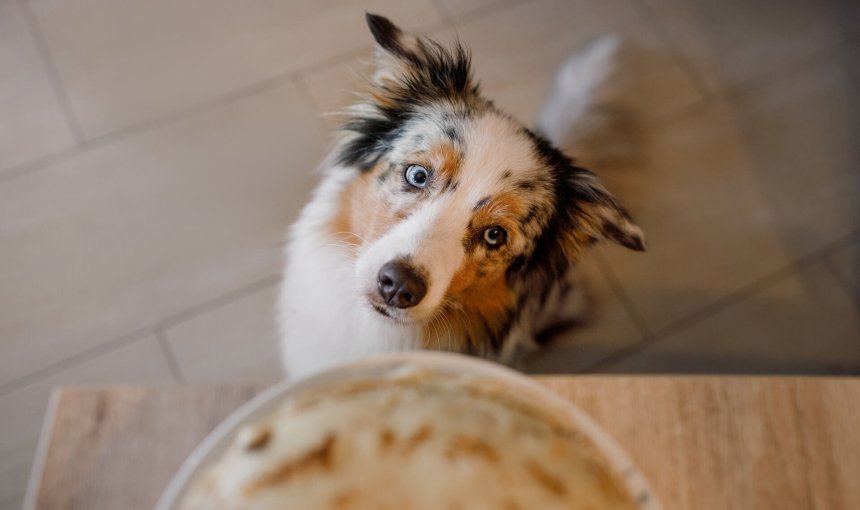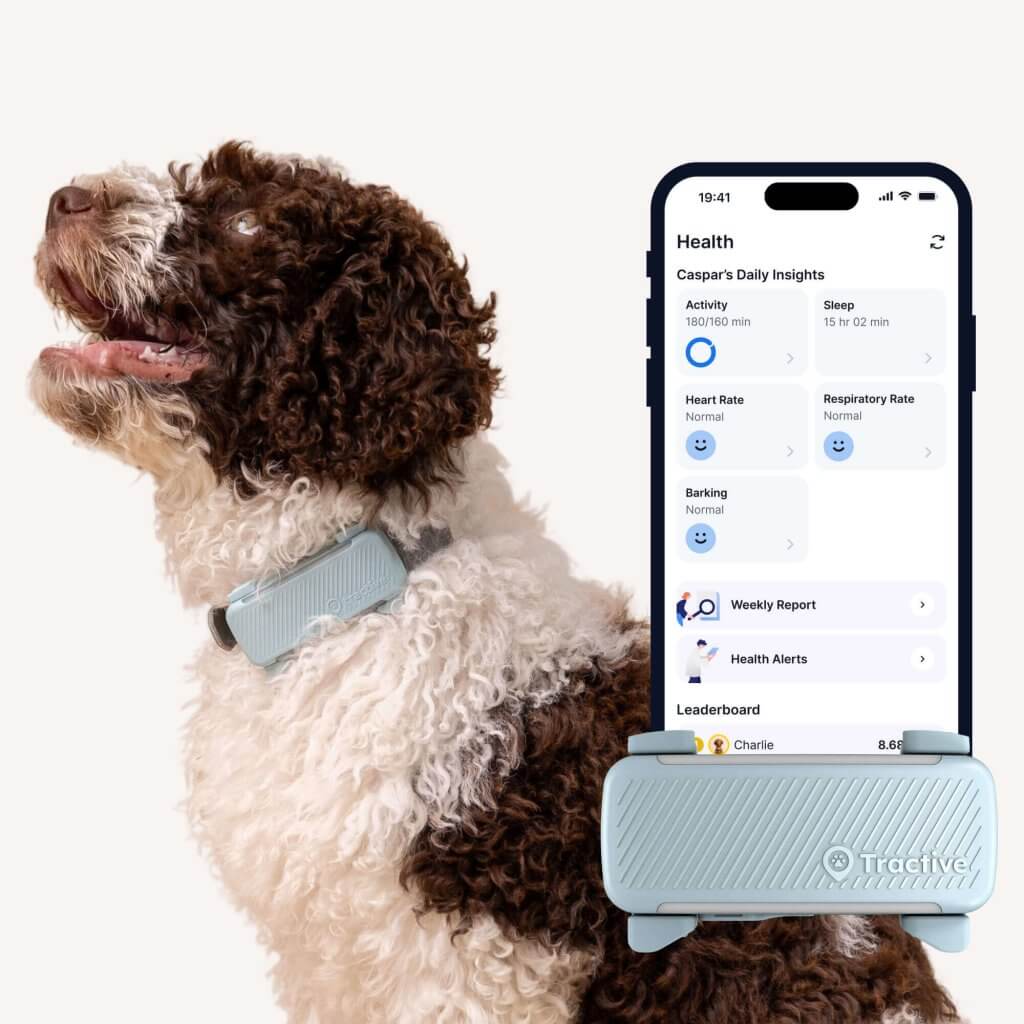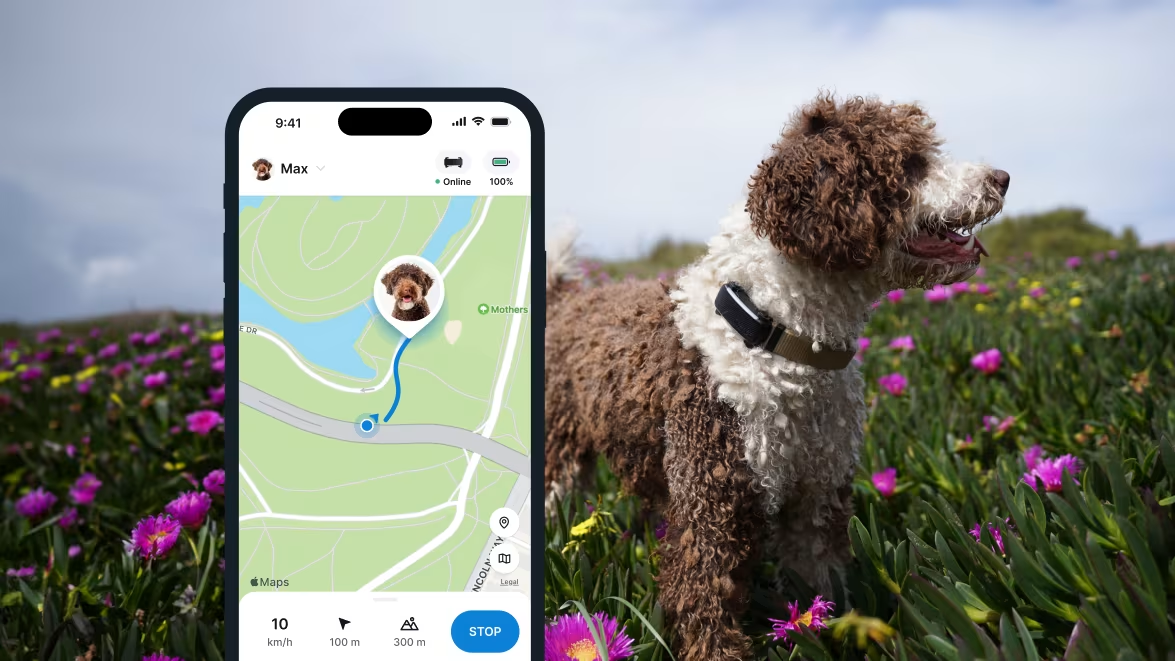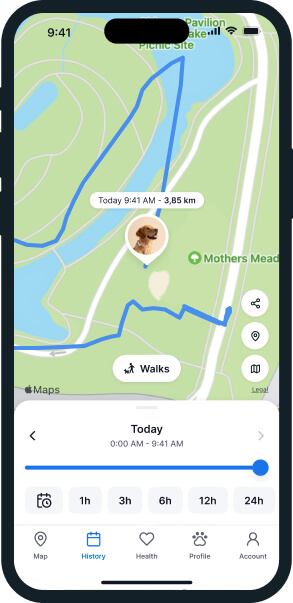 Approved by Dr. Dwight Alleyne, DVM
Approved by Dr. Dwight Alleyne, DVM Why Is My Dog Always Hungry? The 11 Main Reasons
From activity levels to more serious health conditions - a sharp spike in your dog's appetite out of nowhere could be cause for concern. Here's everything you need to know about why your dog seems hungry all the time.

It’s normal for dogs to love food. (Come on, who doesn’t?) But if it feels like your buddy’s stomach is something of a bottomless pit – there might be something more going on. So if you’ve landed here wondering, why is my dog always hungry? it could be due to less concerning reasons…but also other, more serious health conditions too.
So we’re going to dive into some of the most common reasons your dog might seem always hungry, why it’s a concerning sign if you’ve got a senior dog at home, and how you can prevent your dog from scavenging for food from weird places. Let’s get started.

Always know your buddy is healthy & safe
Read moreWhy are dogs always hungry? The less “scary” reasons
Most dogs aren’t picky eaters. In fact, their tendency to scavenge for food is something that comes instinctively to them. (Plus, their wild ancestors would be proud of them!)
Besides, some dogs are just more food-motivated than others. So it can feel like they’re on a “see food” diet – meaning they see food and they’ll eat it. Left unchecked, their health is more likely to suffer if they gain weight over time.
So let’s start with a couple of less concerning reasons your dog might seem constantly hungry. It could just be because they’re:
| 1) On the high-energy side | Like if you’ve got an active dog breed or one that’s been raised as a working dog. Being on the move all day burns calories, so they’re hungrier for good reason! |
| 2) Missing some nutrients in their diet | In this case, your dog might crave extra food to make up for what they’re missing. Sometimes dogs might even eat…well, their own poop or even grass to make up for any missing vitamins and minerals! |
| 3) Have learned it gets them what they want | If yours has learned that begging for food or acting like they haven’t been fed for years gets them a treat, they’ll keep doing it! |
| 4) “Competing” against other dogs or pets | Some dogs might have learned that resource guarding is the way things work. So they might eat more quickly or frequently because they feel the need to “defend” their food by eating it quicker or demanding more. (To prevent another pet from stealing it.) |
| 5) On a specific medication | That may include an increase in appetite as a side effect. |
| 6) From a specific breed | Some dog breeds are more prone to weight gain from overeating, which could be due to their genetic history.1 This includes the Retriever family, some Spaniel breeds, Beagles, and Pugs. However, your dog’s genetics alone won’t make them gain weight. Rather, it’s genetics combined with their environment that leads to weight gain – and the resulting health issues – over time. |
However, some cases of excessive hunger in dogs can be because of more serious underlying health issues. Especially if you’ve got a senior dog at home.

Get health alerts for your dog
Our pups can’t always tell us if something’s wrong. But if their tracker detects unusual changes in their routine, you’ll get an alert, helping you catch potential issues early.
Why is my older dog suddenly hungry all the time?
Dogs age much like we do – meaning, their bodies change as well. Most senior dogs tend to slow down on the activity front, so they’re (usually) less hungry as they grow older. Meaning, if your grand-paw is suddenly gobbling down their food bowl in a single gulp and then demanding more, it could be due to:
| 7) Metabolic conditions | Like, for example diabetes, Cushing’s disease, or hyperthyroidism – all of which can increase your dog’s hunger as one symptom.2 |
| 8) Cognitive decline | Older dogs might forget they’ve already eaten or become disoriented through the day, forgetting their feeding schedule. So they might beg for food from other family members as a result. Watch out for the signs of dog dementia before they arise. |
| 9) Digestive problems | Like, for example, inflammatory bowel syndrome (IBD), gastrointestinal cancer, and pancreatic insufficiency.3 |
| 10) Anxiety | Which can lead to overeating as a coping mechanism, a behavior your dog might pick up from other dogs (or animals) around them. |
| 11) Infection | Especially by parasites like worms that “steal” all the nutrients from your dog’s food.4 So your poor dog can’t absorb any and eats more to make up for the loss. |
Red flags to watch out for if your dog is always hungry
If your dog’s appetite has suddenly increased out of nowhere, drop by your vet for a checkup. More often than not, it could signal a deeper, more serious health issue. Likewise, keep an eye out for other concerning signs, like if your dog’s:
- Experiencing diarrhea,
- Peeing more than usual,
- Vomiting,
- Growing more aggressive around food
- Losing weight despite eating more
⚠️ All of these could signal a medical emergency, so head to your vet right away if you notice these persisting over 24 hours.
What to expect at the vet
Once you’ve dropped by your vet, they’ll most likely run a couple of tests to rule out any underlying health conditions – like diabetes, thyroid issues, or other metabolic disorders. This might include:
- A thorough physical checkup,
- Blood tests,
- Urinalysis,
- Imaging techniques, like an X-ray or ultrasound,
- Examining your dog’s stool under a microscope for any parasites,
- Specific hormone tests to check for your dog’s adrenal levels,
- Specific immunoreactivity tests to check how your dog’s pancreas is functioning.
Go prepared with your dog’s full medical history – plus what their diet looks like on a daily basis.
Treatment options for a dog that’s always hungry
Based on what’s causing your dog’s constant hunger, your vet might recommend you:
- Insulin treatment, if diabetes turns out to be the cause,
- Dietary changes, based on your dog’s metabolic profile and daily habits.
- Anti-parasite medication, if any viruses, bacteria, or parasites turn out to be the cause.
- Specific medication, if Cushing’s disease or pancreatic insufficiency turn out to be the cause.
- Anti-anxiety medication,
- The support of an animal behavioral expert for training support.
- In some serious cases, surgery and even radiation/chemotherapy treatments. (Like if it turns out to be cancer.)
If you’ve been prescribed a specific change in your dog’s diet and/or medication – make sure to follow your vet’s instructions to a T and for the full course of treatment. (Meaning even if your dog seems to be getting better right away.)
⚠️ Likewise, avoid giving your dog any medication that’s designed for humans – like Ibuprofen, for example. More often than not, these contain ingredients that are toxic to dogs.
Read more: How Much Should I Feed My Dog? (And How Often?)
How you can prevent your dog from scavenging for food
A food-motivated, perpetually-hungry dog might start wandering or searching for some extra bites, licks, and tastes in some inappropriate – even dangerous – places. Even worse if they end up eating something harmful to dogs. So here are some steps you can take for both indoor and outdoor dogs to keep them away from any extra “snacks”:
- Keep trash out of reach. Use cans with secure lids or place them in cabinets or areas your dog can’t easily reach.
- Make sure your dog has enough water to drink. It could just be that they’re thirsty instead of hungry.
- Never let your dog into the kitchen unsupervised.
- Consistent feeding times can help your buddy feel less anxious over time.
- Keep around some healthy snacks, like vegetables that are safe for dogs.
- Break up your dog’s meals into smaller portions throughout the day. So they learn not to gobble up everything in one go. (Which can increase their risk of bloating!)
- Practice the “Drop it” command on the regular. This will help your dog learn not to eat just about everything off the floor.
- Prevent your dog from getting bored with some puzzle toys, walks, and plenty of quality time with you.
- Feed your dog away from your dining table. So they learn not to lurk beneath to eat any leftovers.
- Set some firm boundaries with anyone else who might be feeding your dog. Meaning, no extra treats or the dog will know who to go to with the big old puppy eyes at full swing.
- Reward good behavior, like if your dog ignores any food they see outside of meal times. Give them a ton of pets and praise or some extra playtime together. At the same time, try and avoid giving them a treat to reward them every single time – or they’ll pick up the wrong habit!
Now all this makes sense if you’re around to supervise your dog at all times and monitor every morsel that goes into their mouth.
⚠️ But how do you prevent your dog from scavenging – when you aren’t around them all day and they’re used to spending time outdoors?
💡Simple. Try using a GPS tracker for a change.
Loved by dog parents around the world – just like you – a GPS tracker can be an important safety measure if your dog spends any amount of time outdoors and/or is prone to scavenging when out of sight or off-leash.

With just a glance at your phone, your trusty Tractive device helps you monitor everywhere your dog’s been – or is heading to, if you track them in real-time. Or just check your dog’s Heat Map and Location History to ensure your dog isn’t heading anywhere near areas with discarded food, trash, or anything you’d rather they don’t stick into their mouths.

“We don’t have fencing around our property and our adventurous dog regularly gallivanted around our local town, inevitably ending up having eaten something horrendous.
Since putting the Tractive tag on her collar, we have had no trouble driving straight to her, wherever she might be, intercepting her before she can do herself any harm.”
– Ryan, AU (Source: Trustpilot)
Your furry friend’s health and wellbeing means as much as to us as it does to you. So we’ve made it a priority to only share medically-relevant content on our blog. This post was checked, double-checked, and medically verified by Georgia-based vet, Dr. Dwight Alleyne.

Dr. Dwight Alleyne, DVM
Originally from Long Island, New York, Dr. Alleyne began his career at a no-kill animal shelter before becoming a licensed veterinary technician. He graduated from Cornell University Veterinary College in 2006 and completed an internship at Purdue University. Now practicing in Georgia, Dr. Alleyne specializes in soft tissue surgery and ultrasounds. He also writes pet health articles on his website, “The Animal Doctor Blog” (www.anmldrblog.com).



